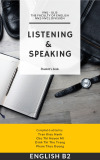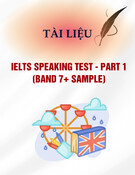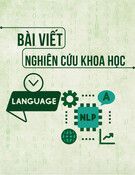
VĂN HÓA https://jst-haui.vn Tạp chí Khoa học và Công nghệ Trường Đại học Công nghiệp Hà Nội Tập 60 - Số 10 (10/2024)
104
NGÔN NG
Ữ
P
-
ISSN 1859
-
3585
E
-
ISSN 2615
-
961
9
THE USE OF ENGLISH MODAL VERBS IN WRITINGS BY NON-ENGLISH MAJOR STUDENTS AT A UNIVERSITY IN VIETNAM
VIỆC SỬ DỤNG ĐỘNG TỪ TÌNH THÁI TRONG CÁC BÀI VIẾT CỦA SINH VIÊN KHÔNG CHUYÊN TẠI MỘT TRƯỜNG ĐẠI HỌC Ở VIỆT NAM Nguyen Thi Tam1,*, Duong Thi Thanh Hoa1, Trinh Thi Ngoc Han2 DOI: http://doi.org/10.57001/huih5804.2024.331 ABSTRACT In academic writing, modality is extremely important since it expresses the writer's attitude toward the ideas they provide a
s well as toward the readers.
According to many researchers, the ability to use modality appropriately significantly contribute to
the pragmatic aspect in English writing. It also indicates a
high degree of linguistic and pragmatic competency in the written mode. However, past research has shown that learners of Eng
lish seem to struggle with
employing modal verbs appropriately. Theref
ore, it is necessary to investigate how Vietnamese learners of English use modal verbs in their writings. For this
purpose, a collection of 75 pieces of writing from 30 non-English major students at a university in Vietnam was analyzed using a quantitative
method. Findings
indicated that Vietnamese learners of English do not use modal verbs frequently in their writing. Besides, they tend to overuse can, should, will
and rarely use
other modal verbs. Based on the analysis of the students' writings, this study proposed possible reasons that account for the
se issues. The study provided some
insights into the use of modal verbs by Vietnamese learners of English as a Fore
ign Language and thus informed the teaching of modal verbs in the English
classroom and contributed to the academic curricula design. Keywords: Modal verbs; modality; auxiliaries; use of modal verbs; using modality. TÓM TẮT Trong văn phong học thuật, động từ tình thái đóng vai trò quan trọng vì nhóm động từ này giúp người viết thể hiện quan điểm, thái độ thông qua nộ
i dung
bài viết tới người đọc. Sử dụng động từ tình thái một cách hợp lý được coi là thước đo cho khả năng hành văn của người học. Nó cũng phản ánh năng lự
c ngôn
ngữ và năng lực dụng học của người học. Tuy nhiên, những nghiên cứu trước đây đã chỉ ra rằng người học tiếng Anh gặp khó khăn trong việc sử dụng động t
ừ
tình thái một cách hợp lý. Do đó, nghiên cứu việc sử dụng động từ tình thái của người Việt học tiếng Anh trong văn viết là rất cần thiết. Với mục đích này, nhó
m
tác giả đã thu thập 75 bài viết của 30 sinh viên không chuyên tiếng Anh, tại một trường đại học ở Việt Nam và phân tích theo phương pháp phân tích định lượng
.
Kết quả nghiên cứu cho thấy, nhóm sinh viên không chuyên tiếng Anh trong nghiên cứu này không thường xuyên sử dụng động từ tình thái trong bài viết củamình. Ngoài ra, nhóm sinh viên náy có xu hướng lạm dụng các động từ tình thái Can, Should, Will và hiếm khi sử dụng các động từ tình thái khác. Dựa trên kếtquả phân tích bài viết của sinh viên, nghiên cứu này đưa ra lý giải cho những vấn đề liên quan đến việc sử dụng động từ tình thái của sinh viên không chuy
ên
tiếng Anh, từ đó đề xuất giải pháp nhằm nâng cao chất lượng dạy và học động từ tình thái trong các lớp học tiếng Anh dành cho sinh viên không chuyên. Từ khoá: Động từ tình thái; tình thái; trợ động từ; sử dụng động từ tình thái, sử dụng tình thái. 1School of Languages and Tourism, Hanoi University of Industry, Vietnam 2Faculty of Basic Sciences, Academy of Policy and Development, Vietnam *Email: tamnt1@haui.edu.vn Received: 12/9/2024 Revised: 23/10/2024 Accepted: 28/10/2024

P-ISSN 1859-3585 E-ISSN 2615-9619 https://jst-haui.vn LANGUAGE - CULTURE Vol. 60 - No. 10 (Oct 2024) HaUI Journal of Science and Technology
105
1. INTRODUCTION Modality holds considerable importance in academic writing as it expresses the writer's attitude toward both their statements and the audience. The ability to use modality appropriately also greatly enhances the pragmatic dimension of English writing [2, 3] and may indicate a high level of both linguistic and pragmatic proficiency in the written form [4]. However, modal verbs present a challenge for many English language teachers and learners because of its complexity. As [1] says “modality is realized by linguistic terms from a wide range of grammatical classes, covering not only modal auxiliaries and lexical verbs, but also nouns, adjectives, adverbs, idioms, particles, mood and prosody in speech”, therefore analyzing modality expressions within linguistics is very challenging. According to [5], modal verbs are considered a complex linguistic unit, making it challenging to simplify their intricacies for learners. If this complexity is reduced, English language learners may find mastering modal verbs less difficult. Previous studies have indicated that English learners often struggle to use modal verbs correctly, frequently overusing or underrepresenting certain meanings or forms of modal verbs [6, 7]. Therefore, it is necessary to examine modal verbs and their use by non-native speakers in the specific genre of research articles. Besides, English language education has always been a primary focus in Vietnam and frequently receive extensive media attention. Numerous strategies have been proposed in teaching grammar of the foreign and second language, especially in teaching modals. [8] discusses the teaching and learning of modals from the easy items to the more difficult ones. However, she discusses and foresees that there is a problem in determining what is difficult or easy and to whom it is difficult or easy - questions which need to be given consideration. Unlike previous studies which compares non-native speaker corpora with native speaker corpora or learner corpora with professional corpora, this study aims to examine how non-English major students utilize modal verbs. It is believed that the study would assist create academic writing programs, provide insight into how students employ modal verbs, and enhance the academic writing proficiency of second language learners. 2. LITERATURE REVIEW 2.1. Modality Despite the long existence, the definition has not been fully agreed upon in various linguistic schools. In simple terms, modality is defined as the speaker's verdict about the "necessity" and "possibility" of subjects [9]. [10] defined modality as "the manner in which the meaning of a clause is qualified so as to reflect the speaker's judgment of the likelihood of the proposition of the sentence being true" (p. 219). [11] also defines modality as the expression of necessity and possibility. He claims that modality is "the speaker's assessment of probability and predictability. It is external to the content, being part of the attitude taken up by the speaker". It can be concluded that modality is the manner that the speaker uses to express their opinion or attitude towards the proposition that the sentence expresses or the situation that the proposition describes. [12] state that English sentences are categorical or modalized. In modalized sentences, modality may be expressed grammatically or syntactically by means of auxiliaries, or it may be expressed in various lexical ways such as full verbs, adjectives, adverbs, etc. However, they further argue that grammatically modality is expressed in terms of mood. If the mood is expressed morphologically, it is considered synthetic. The subcategory synthetic mood has two types, namely the subjunctive and the imperative. If mood is expressed syntactically by means of auxiliaries, it is considered as analytic. The subcategory analytic mood also has two factors, namely possibility and necessity, which are expressed by the auxiliaries may, might, can, could, must, should, need respectively. This analysis can be illustrated in Figure 1. Figure 1. A spatial modal tense, aspect and modality [12] In general, modality can express a wide range of semantic meanings which can be obligatory, necessary, requesting, permissible and so on. These meanings can be expressed through a variety of formal and lexical means such as the morphological mood of the verb, sentence adverbials, modal auxiliaries, and syntactic means. However, modal verbs are the most common devices being used and they are also the focus of this study. Modality is a key component of English language learning. [13] claimed "rarely would one find a speech

VĂN HÓA https://jst-haui.vn Tạp chí Khoa học và Công nghệ Trường Đại học Công nghiệp Hà Nội Tập 60 - Số 10 (10/2024)
106
NGÔN NG
Ữ
P
-
ISSN 1859
-
3585
E
-
ISSN 2615
-
961
9
situation in which modals are not used” (p.75). English language learners use modal verbs to express various notions in both oral and written forms such as hopes, desires, requests, opinions, speculations, permissions, abilities, possibilities, and dreams as well as to formulate conditions. [14] also argued that extensive research has demonstrated the pragmatic significance of modality in writing, describing it as "a discoursal resource for negotiating knowledge claims and expressing a stance toward one’s propositions and readers" (p. 184). 2.2. Modal Verbs [15] defines modal verb as “a verb used with another verb to express an idea such as possibility that is not expressed by the main verb”. He also claims that the modal verbs in English include can, could, may, might, must, shall, should, will, and would. They also have been identified in past literature as core modals [10]. Likewise, according to [16] can, could, may, might, must, shall, should and will are classified into the category of central modal verbs. These modal verbs can be used to express the modal meanings of permission, possibility, ability, obligation, necessity, volition, and prediction. The focus of this study, based on the defining characteristics of modal verbs, is on the nine core modal verbs: can, could, may, might, must, shall, should, will, and would. While the list of modal verbs is fairly limited, the list of possible semantic functions of these verbs fulfill is rather extensive. There is not a one-to-one correspondence of meaning and form, and most modal verbs can fill more than one semantic function. Different modal verbs can have different meanings when they are used in different contexts. According to [16], modal verbs can be divided into three main categories based on their meanings. 1) "Permission/possibility/ability": can, could, may, might 2) "Obligation/ necessity": must, should 3) "Volition/ prediction": will, would, shall From the pragmatic perspective, [17] attaches the values of high, medium and low to different modal verbs. [18] divided modal verbs in terms of their pragmatic values as follows. High value modals: must, ought to, need, and have to; Intermediate value modals: will, would, shall, should; Low value modals: may, might, can, could. 2.3. Studies of modal verbs in writing Extensive research into English modal verbs has been carried out over the last decades, however research in modal verbs use in writing has revealed similar results. In the research studying the use of English modal verbs in academic writing, [19] found that Chinese learners tend to use modal verbs more frequently than professional writers (both native and non-native speakers) when comparing Chinese learners' academic writings with professional corpus which consists of published research articles. His result showed that Chinese learner writers employ modal verbs almost twice more than the professional writer. In the analysis on semantic functions depicted by modals used by advanced EFL Iranian students, [20] found that some meanings were overly used and some of them were not really used by learners. EFL advanced learners had great tendency to use ability meaning of modal can and could while their possibility meaning was not used frequently. Similarly, may and might were mostly used for permission rather than possibility. Should was mainly understood as obligation/ advice than necessity. Will and would tended to be mainly used with the prediction meaning. The modal shall had not been used by EFL learners. From the findings, the researchers showed the importance of drawing learners' attention to other pragmatic functions of modals. Many researchers have studied the use of modality and modal verbs and the reasons about differences in the way people use modal verbs. [21] carried out a study on how cultural values are reflected in the way people from different countries use modal verbs. By comparing essays written by non-English speakers and essays on similar topics written by native speakers of American English, the study found that the use of root modals such as must, have to, ought to and need in native speakers and non-native speakers writing depends on culture and context. Non-native speakers use root modality to express the basic social values and presuppositions about notions of maintaining harmony, family and group responsibility, and extrinsically imposed obligation and necessity. By contrast, native speakers' writings express the preponderance of need to convey intrinsically imposed responsibility and necessity. All previous studies about the use of modal verbs by non-native ESL learners revealed that students were uncertain about choosing appropriate modal verbs to convey modality in their sentences. This could be easily seen in the inaccuracy of modals at the syntactic and semantic levels. They tended to overuse some modals or particular meanings, lack knowledge about register-interference aspects of modals or information about

P-ISSN 1859-3585 E-ISSN 2615-9619 https://jst-haui.vn LANGUAGE - CULTURE Vol. 60 - No. 10 (Oct 2024) HaUI Journal of Science and Technology
107
modal phrases and larger sentence patterns. Many research results also showed that language learners wrote compositions in a non-proficient way in terms of modal auxiliaries and had major problems producing them. Linguists have reported many challenges about using modal verbs that students face, however not many learner-corpus studies have covered the root of these difficulties. To the knowledge of the researcher, no one has done a learner corpus study to investigate whether Vietnamese learners, are familiar with the use of modal verbs. Consequently, this study is conducted to find answers for this issue. This study aims to answer the research question "How do non-English major students use modal verbs in their writings?" 3. RESEARCH METHODOLOGY The study was carried out in a university where English is an obligatory subject. 75 pieces of writing were collected from 32 second-year students majoring in Business. Since it took a great deal of time to analyze, the number was believed to be reasonable. These pieces of writing were categorized into 5 themes selected in the textbook “Basic English 3” for students of Business. These writings were chosen among students of all three English levels including poor, average and good students, which were decided by their English grades at class. In each writing topic, the researcher only collected 15 pieces in which 5 pieces from the group of poor students, 5 pieces from the group of average students and the last 5 pieces from the good student group. The writings were chosen from students of all English levels, so the results could be reflected more objectively. The following are the five writing topics of the writings collected as data of this research: - Imagine that you are an employee at a company. Write a paragraph about your office. - Write a paragraph about a job that you want to do after graduation - Write a paragraph about a company you would like to work for after graduation - Imagine that you are an office manager. Write a paragraph about office etiquette to new employees. - Write about your career plan after graduation. The research used quantitative analysis to examine the use of modal verbs through students’ own pieces of writing. Due to the time limitation and other resources, only nine modal verbs were surveyed: can, could, may, might, shall, should, will, would and must. Apart from must, these modal verbs are paired as present and past tense counterparts of single lexemes (can/ could, may/ might, shall/ should, will/ would). Word count function by Microsoft Word was used to capture all instances from learners' writing of the nine modal verbs. Counts were made of total as well as individual modal use in writings. 4. DATA ANALYSIS 4.1. Overall counts The overall frequency counts of the use of modal verbs by the students are provided in Table 1. Table 1. Frequency counts of nine modal verbs in writing corpora Modal verbs Learner Corpus Frequency Ranking can (cannot, can't) 213 1 will (will not, won't) 115 3 could (could not, couldn't) 0 --- would (would not, wouldn't) 0 --- may (may not) 12 5 should (should not, shouldn't) 162 2 might (might not) 0 --- must (must not, mustn't) 21 4 shall (shall not, shan't) 0 --- Total modal verbs 523 Total words in writing corpus 13542 The results in Table 1 shows that only 5 out of 9 modal verbs were found in students’ writing, which showed that student corpora exhibited a low frequent use of modal verbs. The high count in the corpora was 15.7 modal verbs per 1,000 words and the low was zero modal verbs per 1,000 words. While can and should were used more frequently than others, some modal verbs such as would, might, shall were not used by students in the writing corpus. In a total of 13542 words, modal verbs were only used 523 times. Can was the most frequently used modal verb with 213 times in all forms (positive form, negative form, shortened negative form). The second place was should which appeared 162 times in the corpora. Will is another modal verb that was used with high frequent level in the corpora in comparison with other modal verbs with 115 times. May and must was used only 21 and 12 times respectively. Other low frequent modal verbs such as would, might, shall, could were not used at all in the corpora. It is immediately obvious that three modal verbs can, should and will occupied the majority of modal verbs used

VĂN HÓA https://jst-haui.vn Tạp chí Khoa học và Công nghệ Trường Đại học Công nghiệp Hà Nội Tập 60 - Số 10 (10/2024)
108
NGÔN NG
Ữ
P
-
ISSN 1859
-
3585
E
-
ISSN 2615
-
961
9
by the learner writers, which account for 93.7% while may and must were rarely used by students in their writings. Can was the greatest use with 40.7%, taking up nearly half of all modal verb use. Should was the second frequently used modal verb, which accounts for about one third of all modal verb use in comparison with 22% of the use of will in learner writing. Must and may are the least frequently used modal verbs, accounting for 4% and 2.3% respectively. 4.2. The use of can, should, will, may and must Can According to [16], the meaning of a modal verb can indicates permission, possibility and ability. Two kinds of meaning of can can be found in student writing corpus, indicating ability and possibility. In the corpora, can was mainly used to express the ability. Participants in the study used can in almost all situations when they wanted to express ability. Can was used in almost all situations when students wanted to indicate ability although there were many other ways or modal verbs that students could use such as be able to, may, might. Can is also used to express possibility, however this kind of meaning is used with low frequency. In some situations, students use can to indicate uncertainty or tentativeness, which is inappropriate. In the writing corpus, there were 8 times that can was used to express the possibility but 6 out of 8 times it was used to express uncertainty. However, [16] state that can is especially ambiguous in academic prose, since it can often be interpreted as marking logical possibility or ability”. This is particularly true in the learner corpus as besides the above three functions, can is sometimes used with ambiguity between legitimacy and ability or as a chunk. Should From description of modal semantic class by [16], should indicates obligation (the agent is obliged to do something) and necessity (logical concludes something is likely/necessary based on evidence available). In the corpora, "should" is mainly used for the purposes of obligation. Should is also used to indicate necessity. However, this meaning of should is used with very low frequency. There were only 8 times in which students use should with this kind of meaning. Will In the corpora, the modal verb will was most used to indicate prediction or future plan. Will was used in every situation in which students wanted to express their future plan. Must Must was used infrequently in the writing corpora, indicating the meaning of necessity. 4.3. Syntactic Analysis of Students' Usage of Modals In the study, most of the occurrences of the modals were followed by the infinitive construction. In most writing pieces, modal verbs were used grammatically correctly. There was only one incorrect verb form in all writing pieces. ... I can to apply what I have studied at university to my work. (File Topic 5) The error found in sentence was with the verb form, where the base form (without "to") of the verb "view" should be used after the modal verbs. They should be rewritten as following. ... I can apply what I have studied at university to my work. This minor error underscores a specific area for improvement, highlighting that while students generally handle modals well, occasional lapses in verb form consistency may occur. Such errors can stem from the influence of different languages or dialects, which sometimes include similar constructions, or from overgeneralizing the pattern of infinitive use in English. The near absence of errors, however, reflects that students overall exhibit a strong command over modal constructions. 4.4. Misuse of modal verbs Another incorrect use of modal verbs was that some modal verbs were used when they were unnecessary or inappropriate. ... The computer helps me can do many things. (Topic 1) ... To become a good accountant, I’ll need to have good numeracy skill because I’ll have to deal with many numbers. (Topic 2) The error found in the sentence above was with the wrong use of the modal verb, where the modal verb is unnecessary or inappropriate. The use of modal verbs in these sentences even made these sentences grammatically incorrect and caused readers confused. It should be rewritten as following: ... The computer helps me do many things. (Topic 1) ... To become a good accountant, I need to have good numeracy skill because I’ll have to deal with many numbers. (Topic 2)



![Mẫu câu viết thư thân mật bằng Tiếng Anh [Chuẩn Nhất]](https://cdn.tailieu.vn/images/document/thumbnail/2025/20250708/caotiendat91211.thd2017@gmail.com/135x160/80151751961845.jpg)
![Tài liệu gợi ý viết email tiếng Anh và 35 đề thi mẫu [chuẩn SEO]](https://cdn.tailieu.vn/images/document/thumbnail/2025/20250708/caotiendat91211.thd2017@gmail.com/135x160/25321751961846.jpg)







![Đề cương môn Tiếng Anh 1 [Chuẩn Nhất/Mới Nhất]](https://cdn.tailieu.vn/images/document/thumbnail/2025/20251130/cubabep141@gmail.com/135x160/51711764555685.jpg)










![Mẫu thư Tiếng Anh: Tài liệu [Mô tả chi tiết hơn về loại tài liệu hoặc mục đích sử dụng]](https://cdn.tailieu.vn/images/document/thumbnail/2025/20250814/vinhsannguyenphuc@gmail.com/135x160/71321755225259.jpg)


